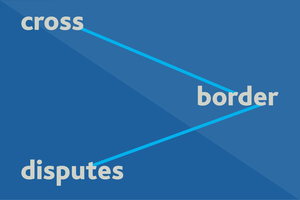Private International Law Bill introduced in Parliament
The UK has regained full competence to strike international agreements on Private International Law since leaving the EU.

cross border disputes
- now we have left the EU, the UK can capitalise on regaining full competence to enter into international agreements in Private International Law
- new Bill will allow those international agreements to be implemented in domestic law
Private International Law (PIL) agreements provide a legal framework to help resolve cross border legal disputes – from seeking to help the return of children abducted by a parent, deciding which court resolves an international business dispute, to helping to prevent a spouse living abroad dodging child maintenance obligations.
This Bill allows the UK to implement these agreements in domestic law, thereby helping individuals, businesses and families to resolve cross border disputes.
Justice Secretary Robert Buckland said:
Now that we have left the EU, we can capitalise on the UK’s regained competence in this area of law.
This Bill allows us to implement and operate current and future agreements on Private International Law, giving confidence to UK businesses, individuals and families looking to live, work, travel and trade across borders.
Without the ability to implement these agreements in domestic law, there could be parallel court cases in different countries, leading to conflicting decisions where UK individuals, businesses and families would bear the brunt of legal costs.
The Private International Law (Implementation of Agreements) Bill, was introduced in parliament yesterday (27 February 2020).
The Bill maintains our implementation of 3 key existing agreements, also known as Hague Conventions, while enabling the UK to implement other international agreements in PIL in domestic law in future via secondary legislation including the Lugano Convention 2007.
Notes to editors
- Private International Law agreements cover aspects of civil, family and commercial law, with a real and lasting impacts on people’s lives. PIL agreements could mean, for example
- child maintenance obligations imposed in one country can be recognised and enforced in another
- UK citizens can have confidence that if they travel, buy goods or have an accident abroad there is a way to resolve any legal disputes that may arise.
- businesses can feel confident entering into cross-border transactions, knowing that in the event of a dispute, there is a clear framework of rules for resolving it
- divorces can be recognised in other countries
- children abducted by one of their parents can be returned to their home country, and
- businesses can feel confident entering into cross-border transactions, knowing that in the event of a dispute, there is a clear framework of rules for resolving it.
- Beyond underpinning future deals, the Bill simplifies the implementation of three existing Hague Conventions at the end of the Transition Period:
- 1996 Hague Convention on Jurisdiction, Applicable Law, Recognition, Enforcement and Co-operation in Respect of Parental Responsibility and Measures for the Protection of Children: Helps resolve issues around residence and contact with children where parents live in different countries
- 2005 Hague Convention on Choice of Court Agreements: Offers legal certainty in some cross-border contractual disputes by deciding which court should hear a case and enabling the decision to be recognised and enforced in another country
- 2007 Hague Convention on the International Recovery of Child Support and Other Forms of Family Maintenance: Guarantees international recovery of child support and other forms of family maintenance across borders
-
A strategy for Private International Law will be set out in the coming months.
- The Bill was introduced in the House of Lords on Thursday.